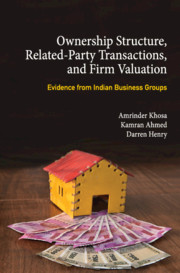 Ownership Structure, Related Party Transactions, and Firm Valuation
Ownership Structure, Related Party Transactions, and Firm Valuation Book contents
- Frontmatter
- Contents
- List of Tables
- 1 Introduction
- 2 The Evolution of Business Groups, Institutional Framework in India, and Related-Party Transactions
- 3 Theory and Literature Review
- 4 Hypotheses Development
- 5 Research Methods
- 6 Descriptive Statistics
- 7 Empirical Results
- 8 Additional Tests
- 9 Implications of the Study and Conclusion
- Appendix 1 List of Sample Firms
- Appendix 2 List of Business Groups
- References
- Index
3 - Theory and Literature Review
Published online by Cambridge University Press: 26 April 2019
- Frontmatter
- Contents
- List of Tables
- 1 Introduction
- 2 The Evolution of Business Groups, Institutional Framework in India, and Related-Party Transactions
- 3 Theory and Literature Review
- 4 Hypotheses Development
- 5 Research Methods
- 6 Descriptive Statistics
- 7 Empirical Results
- 8 Additional Tests
- 9 Implications of the Study and Conclusion
- Appendix 1 List of Sample Firms
- Appendix 2 List of Business Groups
- References
- Index
Summary
The previous chapter presented the background and institutional framework in India. This chapter presents the theoretical framework of the study and reviews relevant literature. This starts with the discussion of agency theory. In particular, Type 2 agency costs are discussed in detail—form that prevails in family firms. The proposed framework establishes the research foundation of this study.
Agency theory
Agency theory has been extensively used by researchers in finance (Fama, 1980), economics (Spence and Zeckhauser, 1971), accounting (Fan and Wong, 2002), management (Douma, George, and Kabir, 2006; Peng and Jiang, 2010), and organizational (Schulze, Lubatkin, Dino, and Buchholtz, 2001) studies. Agency theory advanced the risk-sharing literature to account for the problem that occurs when cooperating parties have different goals (Eisenhardt, 1989). The divergence of interest between a principal and agent imposes a cost on the firm, which is commonly known as a Type 1 agency cost. Jensen and Meckling (1976) argue that agency costs are likely to decrease with the level of insider ownership and, thus, corporate performance improves with the level of insider ownership in the firm. However, Demsetz (1983) argues that an increased level of inside ownership presents a principal–principal conflict. This is called a Type 2 agency cost, which arises from the conflict between two groups of shareholders.
Entrenchment effect and convergence-of-interest arguments also suggest similar view about underlying agency costs.
Entrenchment effect: The entrenchment effect is consistent with the traditional view that family firms tend to be less efficient because concentrated ownership encourages controlling shareholders to expropriate the wealth of minority shareholders. Family members generally occupy important positions in family firms, which provide them with the power to expropriate outsiders. The family-dominated board may lack independent oversight and, thus, result in ineffective monitoring by the board. The indirect ownership obtained through cross-holdings makes the situation even worse. The controlling shareholders have greater incentives to expropriate the wealth of shareholders when they have lower cash-flow rights. Bertrand et al. (2002) provide evidence of expropriation of outsiders by controlling owners of business groups in India. Douma et al. (2006) also provide evidence of unique agency problems arising from principal–principal goal incongruence in group-affiliated firms in India.
- Type
- Chapter
- Information
- Ownership Structure, Related Party Transactions, and Firm ValuationEvidence from Indian Business Groups, pp. 27 - 60Publisher: Cambridge University PressPrint publication year: 2019


